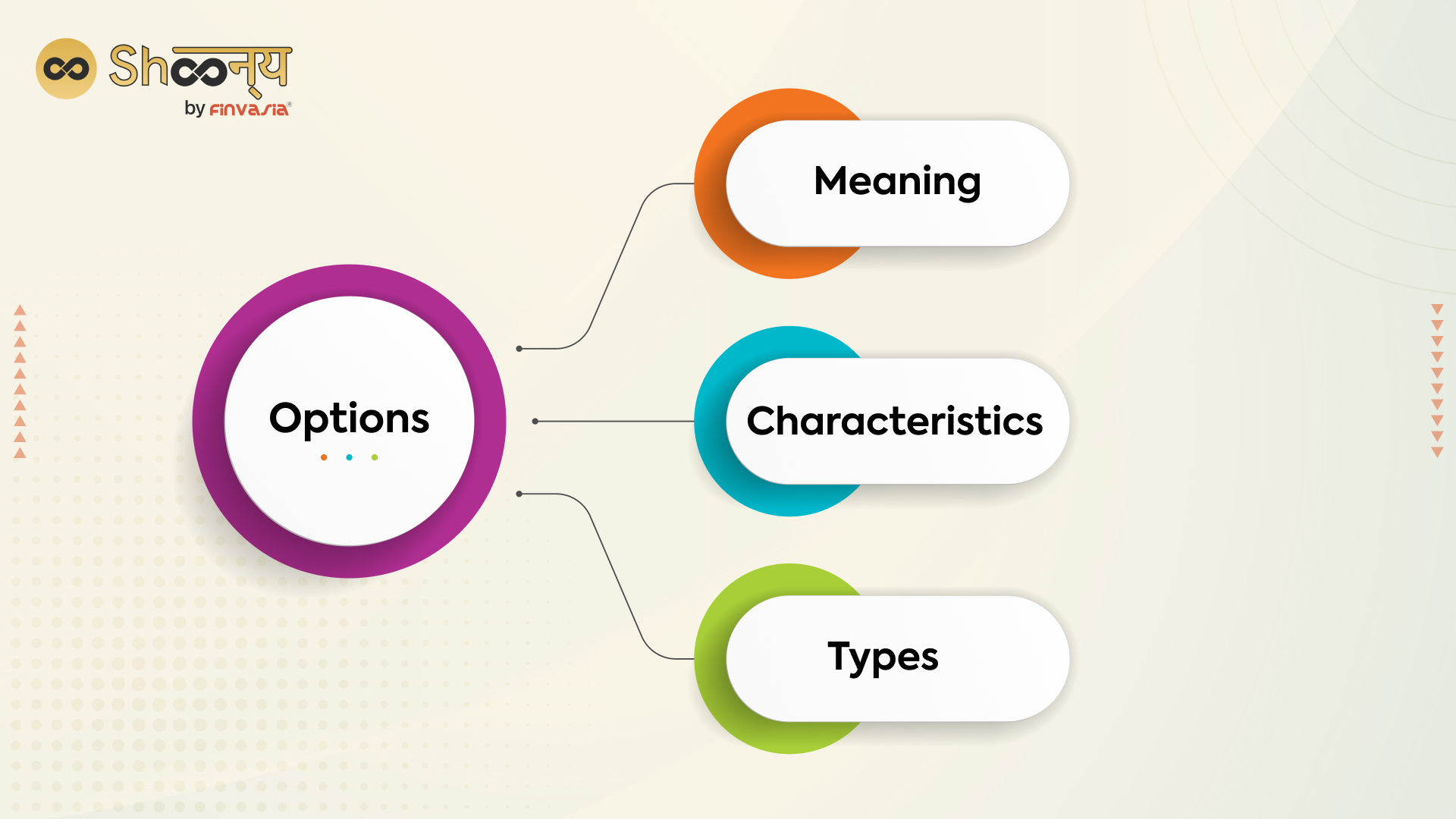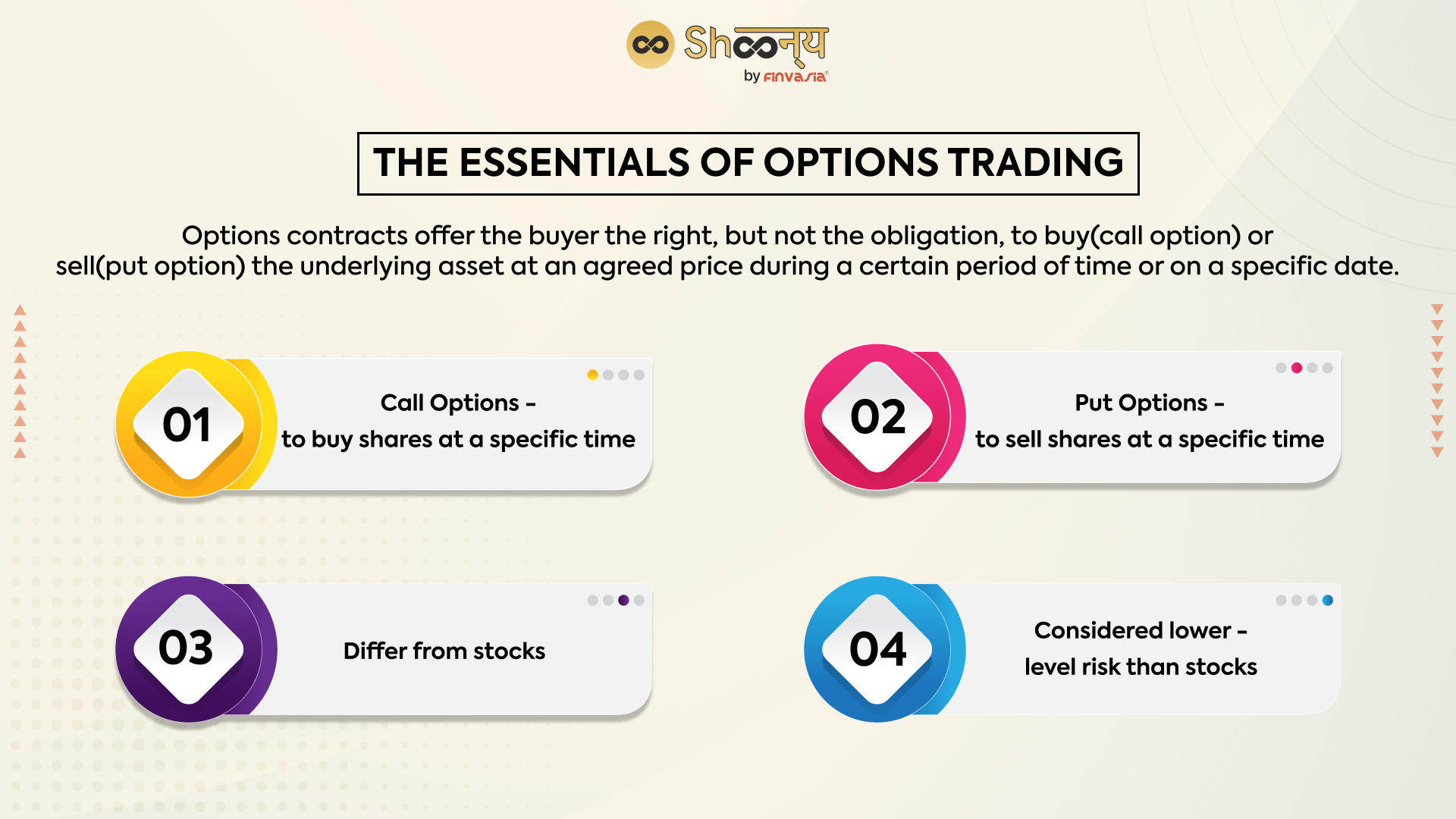Options Trading: Meaning, Characteristics, and Types

An option is a financial derivative contract that provides the buyer or holder with the right but not an obligation to buy or sell the underlying asset at a predetermined date and time. Though options trading is considered a bit more complex, profits are expected to be relatively large if the security price increases.
This is because the buyer does not have to pay the full price for the security in an options contract.
Characteristics of Options:
1. Advance Payment- The Options buyer is supposed to pay an amount called a premium, which provides the rights that an option specifies for the buying and selling of certain investments from or to the other party in the future at predetermined prices.
2. Option Validation is a promise made by the seller to the buyer that until the Option contract is valid, they will agree on the future buying and selling for the underlying security (i.e., Option) at a specified stock price.
3. Strike Price- It is a price at which the option owner decides to buy or sell the underlying asset. This rate is fixed and remains unchanged throughout the contract.
4. Expiration Date: This is the last date of the contract, after which the contract would become null and void if not exercised by the investor.

Types of Options:
Options vary based on the underlying asset and expiration cycle:
Underlying Security-Based Types
- Stock Options: Tied to shares of publicly listed companies.
- Index Options: Linked to stock market indexes like NSE, BSE, etc.
- Forex/Currency Options: Involving specific currency exchange rates.
- Futures Options: Linked to specified futures contracts.
- Commodity Options: Relating to physical commodities or commodity futures contracts.
Expiration Cycle-Based Types
- Regular Options: With standard expiration cycles and varying months.
- Weekly Options: Featuring shorter expiration dates.
- Quarterly Options: Aligning with the nearest four quarters and the final quarter of the following year.
- Long-Term Expiration Anticipation Securities: Stretched over one to three years.
How do Options work?
Now, you might wonder how the investors would decide which option to choose.
They will analyze each option’s profitability by calculating the difference between the strike price or the predetermined price on which the investor exercises the Put and Call Options.
People use options for a passive income, speculating and hedging the risks.
Let us understand this better with the help of an example.
Imagine you have a call option of USD 90 (i.e., Strike price), and the stock prices rise to USD 100 (i.e., Market price). So, here, we can make a USD 10 profit by exercising the Call option.
(i.e., buying the USD 100 stock at USD 90)
Strategies for Success in Options Trading
1. Enhancing Portfolio with Leverage
Options trading demands a lower initial investment compared to outright stock purchases. By spending less on premiums and trading fees, investors gain exposure to potentially larger gains.
2. Hedging and Income Generation
Options can serve as powerful hedges against market downturns, mitigating potential losses. Moreover, certain options strategies generate consistent income streams, bolstering portfolios.
3. Flexibility and Strategic Execution
Traders enjoy strategic flexibility, adjusting their positions before contract expiration. This adaptability allows for capitalizing on market trends and minimizing risk exposure.
Crafting Success with Call and Put Options
Using Call Options
A call option empowers traders to purchase shares of an asset at a predetermined rate before the contract’s end. Rising asset prices favour call options, enabling traders to buy at a discounted “strike price.”
Using Put Options
Conversely, a put option empowers traders to sell shares at a predetermined rate before contract expiration. Declining asset prices favour put options, as traders can sell at a higher “strike price.”
Conclusion:
This blog highlights the meaning and characteristics of options that will assist you with a passive income.
To choose the best option for yourself, you can visit Shoonya, an online trading platform by Finvasia. It offers advanced tools for easy comparison. The best part is you don’t have to pay any brokerage as it provides trading services at zero life commission.
FAQs: Options Trading
Options trading differs as it offers the right, not obligation, to buy/sell at a predetermined price within a set period. Stocks represent ownership in a company.
Options trading can be riskier due to market conditions, but hedging strategies can help manage risk effectively.
Yes, certain options strategies provide consistent income streams, enhancing portfolios.
Options are versatile and can suit various investor profiles. Long-term investors can benefit from hedging and leveraging strategies.
______________________________________________________________________________________
Disclaimer: Investments in the securities market are subject to market risks; read all the related documents carefully before investing.








